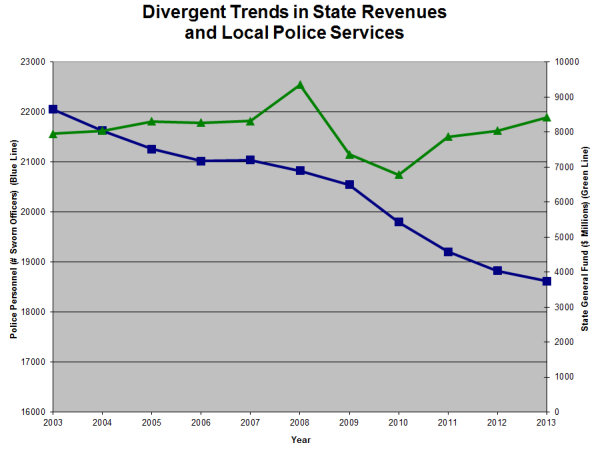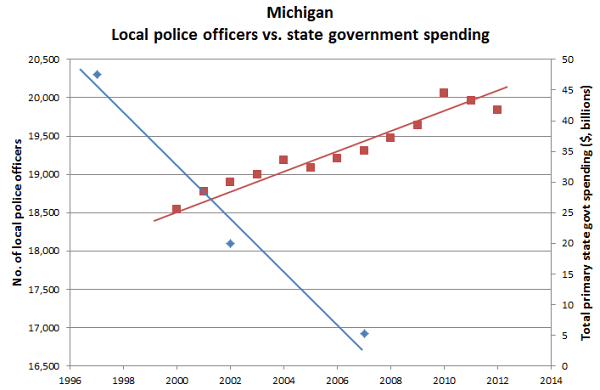“The laws right now are written to mete out punishment to local officials, but there need to be clear partnership requirements for the state to address fiscal stress.”
Flint, Michigan is rare in that it has not had just one Emergency Manager. It has had four different managers and the current “emergency” is the second one for the former manufacturing powerhouse:
- Jul 2002 – Jun 2004 — Ed Kurtz
- Dec 2011 – Aug 2012 — Michael Brown
- Aug 2012 – July 2013 — Ed Kurtz
- July 2013 – October 2013 — Michael Brown
- October 2013 – present — Darnell Earley
Through most of this Dayne Walling was the mayor of Flint. On Election Day 2011, he learned (a) that he had won reelection and (b) that he would be losing all of his power to Michael Brown, the city’s new Emergency Manager. This threw a monkey wrench into the gears of an ongoing master planning process that was well underway (read about that in Part 1 of this interview HERE.)
Walling has made the best of the situation and his ability to work with his state-assigned overseers has made Flint’s experience a bit less turbulent and antagonistic than in other cities. However, Walling still has strong opinions about why Public Act 436 — Michigan’s current Emergency Manager law — and its predecessor, Public Act 4 are failing Flint, the cities, and school districts of Michigan. And, more importantly, how this draconian, anti-democratic law is failing to address the core problems that lead to financial “emergencies” in the first place.
Below is Part 2 of our interview which focuses mainly on life under an Emergency Manager in Flint.
Photos by Anne C. Savage, special to Eclectablog.
So, you’ve been working hard on the master plan process in Flint for the past three and a half years. For about two years now you’ve had your powers taken away and given to an Emergency Manager who is running the city now. How has the Emergency Manager fit into this process? Has he been involved at all? I guess there’s been more than one, right?
Yeah, we’ve had three different managers and two different laws since I’ve been mayor.

Michael Brown has been the one who has been in place throughout most of this, right?
Yeah. It’s been good for the planning process that each of them allowed it to continue and made the necessary financial decisions with regard to staffing and consultants for us to fulfill the original federally-funded plan. That’s what we keep going back to. We’ve got a three-year work plan and we’ve made a commitment to the Department of Housing and Urban Development. So, we said, “Let’s just all do what we need to do to work through that.” That’s how’s it’s been.
So, he’s been supportive of your work.
Yes.
Do you think having an Emergency Manager running things has given you more time to work on the master plan process?
I have heard some people say that! And, it’s true, I’ve had more time to devote to the planning process under this arrangement than I would have without it. Whether that’s better or worse, I don’t know. But, I have had more time.
It sounds like something you would have devoted your time to either way.
I definitely wanted to. That was a commitment that I had made. But, it is hard when there’s a financial crisis every week. To try to look farther down the road is difficult. This whole experience of the last four years — elected, reelected, the Emergency Manager, master planning, and everything that’s gone along with that — I definitely have an appreciation for the need to do more and better long term planning in the state of Michigan and all of our municipal communities. I think it’s an area where Michigan has really missed the mark.
Does the Emergency Manager have to approve any of the zoning that takes place? At the end of the day, you folks take care of all of this stuff then he has to sign off on it. Is that correct?
Yeah, that’s accurate. Because there’s all of the purchasing issues and the master plan itself. The zoning code is an ordinance so the planning commission will be involved, myself, and then the manager will have to approve it. It’s important that all three groups are involved so there’s not any issue in the future. If Public Act 436 is ruled by the U.S. Supreme Court to be unconstitutional, things will be in place that would authorize this work separate from that.
It seems like you and Michael Brown had a pretty good relationship, in general.
Yeah, we knew each other beforehand and worked cooperatively.
So, it wasn’t quite the antagonistic relationship that, say, Benton Harbor had with Joe Harris.
There were more than enough tensions to go around. But, my thinking, clearly, was that elections have a consequence and for those of us that didn’t like laws like that, we needed to organize for upcoming elections. If there had been a Democratic majority in the House after the 2010, there never would have been a P.A. 4. If you want to talk about the clear consequence of an election, that’s it!
We did vote it down, by the way! We DID have an election, but there didn’t appear to be any consequences!
Yeah, well, not when you still have a Republican House, Senate, and Governor.

What’s interesting is that, even though Flint was being run by a non-elected Emergency Manager, people were still engaged and willing to get involved in making things better. It’s a good lesson, maybe, for other cities.
People have their own ideas about how they’re granted the right to self-governance. Many people mistakenly think that the State Home Rule authority means that the state can’t take that away. But, legally, that’s just not true. The reality is that the state can grant and take away rights if that’s upheld by the courts. Obviously, we haven’t completed that process yet, but this really does show that democracy is a more natural force. Different governments can try to channel or control it, but, at the end of the day, there’s a very powerful, inherent drive for self-governance that we have as people. Thankfully, we’re in a country where that can flourish.
We’re taught from when we’re children that that’s what we stand for. After all, we are the UNITED States of America.
Right. Separate from however the Supreme Court rules in this case, we believe we have a right to our government and that we have the right to elect the people to run the government. That’s really the force that drove this forward.
Talk a little bit about your experience. You’ve been on the front lines of operating under an Emergency Manager more than anyone else or at least as much as anyone else as an elected official. What do you see as the benefits, if there are any, and where did that go wrong? Where did that process go wrong in terms of creating sustainable communities? I don’t want to editorialize too much, but one of my complaints about the Emergency Manager law is that it is not arming the Emergency Managers with tools of CONstruction, only with tools of DEstruction. You guys are CONstructing something and he can only take things away. He can only subtract. What are your thoughts?
I think there is a serious underlying problem with municipal and school district financing in the state of Michigan. We need to find a durable, equitable solution to that. I start with the core problem and I want a real solution. The Emergency Manager efforts, as they’re constructed now, deal with a very few number of cases in an unfair fashion. It’s not a solution that works for me and for my values.
Someone else can say, “Well, the city of Flint has less overall OPEB [Other Post-Employment Benefits] liability than it did two years ago.” And that’s true. Someone can say that and they’re right. That’s in the actuarial analysis and the audit. But, I don’t think that is the measure of our community.
In 2004 when Emergency Manager Ed Kurtz left and said everything was “fixed”, it didn’t stick!
Right, the budget was balanced, but things could very quickly change from that. And they did.
The original Public Act 72, which had bipartisan support, was much more about creating a process to intervene when there was criminal or corrupt activity. I think all of us agree that the state needs to have a process to intervene when there is crime or corruption. The criminal justice system is slow and there needs to be some way to protect the fundamental interests of the community. But, when you broaden it to say we’re going to use emergency managers’ tools and rhetoric to try to address long term, structural financial problems, it doesn’t work. See, a long term chronic financial problem is not a financial emergency. It can get to a point where it looks like an emergency, but that’s not the problem. As I’ve had the opportunity to talk about it, that’s been my focus.
I can’t debate that the city of Flint had a financial crisis, emergency, problem, whatever word you want to use. But, the solution for our state is not to have an emergency a month forever. It’s to set in place a new set of policies around local governments that are going to work for ALL our thousand municipalities at once.
As a local government in Michigan, you face more red tape and bureaucracy and uncertainty from the State of Michigan than anywhere else. So, if we’re a creature or child of the state, you know, that’s no way to treat your children and relations.

Give me some examples of what you mean by red tape.
Well, starting with the great recession, when the federal government was investing in state general funds through the Stimulus, the state was cutting revenue sharing for local government. So, the state gets over a billion dollars in flexible funds and they cut the amount that’s coming down to us. What you have over time is trend lines that diverge. You’ve got state revenues from Stimulus and forward going in one direction and local government revenues going in the other. I mean, local governments are still in a recession. Our budgets are getting smaller every year. The number of police officers across the state in every community combined are getting lower every year and there’s no end in sight.
Here is a chart provided by Mayor Walling depicting the divergent trend lines. The number of police officers was chosen as a local metric because cutting police and fire fighters is the last resort local municipalities turn to when cutting their budgets:

[Chart provided by Flint Mayor Dayne Walling]
Here is another representation that I put together based on U.S. Census Bureau data:

In other words, the crisis is structural. It’s not community by community. So, revenue sharing is one.
Another example is that there are these Other Post-Employment Benefits liabilities that are more than individual units of government can bear. There have been changes in the health care industry that no one predicted 30 years ago, for example. I don’t think anyone’s to blame, it’s just the reality of the situation that we’re in. Five years ago the city of Grand Rapids proposed that the state create a common pool, starting with public safety personnel, where communities could join this statewide pool that would have the financial support of the state. Not though direct deposits but through credit rating so that we could borrow and manage those liabilities at the lowest possible rate.
Look at what’s happening in Detroit right now. Detroit’s been left out there by itself without any support from the state in terms of long term liabilities. Belle Isle is a drop in the bucket compared to their long term liabilities. Why isn’t the state of Michigan there for Detroit the way the state of New York was there for New York City in extending low-cost bonds to smooth out this problem? The problem doesn’t go away but the problem’s a lot more manageable at 2% than it is at 7%!
Some people say, “Well,the unions were just so strong that they created these liabilities.” Is that an accurate assessment, in your opinion?
Look, every contract is signed by two parties. They’re signed by unions and management. So, I think the post-employment benefits are very important. They really make up a very large part of this liability because communities weren’t prefunding it. Pensions are different. Even when you hear that pensions are under-funded, they’re still funded. But, in almost every community there’s nothing for health care benefits going forward. Those are done on a pay-as-you-go basis.
There have been a variety of financial decisions made over the years where people weren’t looking long term.
I think another thing we should be doing is that we should all be doing two-year budgets which is something that is in PA 436. But, it shouldn’t be just for a few communities. We should ALL be doing two-year budgets. We should ALL be doing five to ten year forecasts so that we can all have information about those expenditure and revenue trends. Then we can have an educated discussion in each community about that information as opposed to it being dictated from the outside.
Are you going to run for mayor again?
Yes.
This will be your third term, right?
Yes. I’m going to run again in 2015. I always knew when I committed myself to this work that it would be an eight to ten year project. With the first term being a partial term from a special election, at this point I’ve been in office four years. I’ll have been in office six years when, hopefully, I’m reelected in 2015. That will get me that ten year timeline.
Most people wouldn’t wish being the mayor of a place like Flint on their worst enemy! It’s a city that people see as being in decline and full of crime. What motivates you?
Well, this is home for me. No matter where I’ve lived, I have had a concern for what’s happening here. It was an epiphany for me when we were living in Minnesota and I was doing work with the Urban Coalition and other community organizations, that my career was in urban policy, community and neighborhood initiatives and my home town needed it more than anywhere else.
So, you had moved away and then come back?
Yes.
What was the timeframe for that?
We moved back in the spring of 2006 and ran for mayor in 2007 and lost to the incumbent. He then retired and created this special election. It got too hot in the kitchen for him!

Well, like I said, not everybody would embrace this like you have!
Right! But, it is not an exaggeration to say that there hasn’t been a single day that I haven’t wanted to jump out of bed and get to work. Seven days of week.
And your family seems to be okay with it!
Yeah, they’re incredibly supportive.
We’ve talked about the kind of challenges that are presented by the way the state is rolling out the Emergency Manager process. What types of things could be done to improve that? If you could wipe away what we have now and either roll back to PA 72 or create something new, what would be an improved vision for fixing these financial problems experienced by so many schools and municipalities?
Look at the title of these bills. They’ve been all about local government distress or accountability. I think we need to have a common framework — city, county, state, township — there needs to be a joint or shared accountability for the quality of life in our communities. The state of Michigan needs to commit to reforms. There need to be new ways for cities and counties and other municipalities to work together. And then, of course, each individual unit has to be willing to do two-year budgets and long term forecasts and make sure that decisions that are being made don’t have an adverse future cost.
What’s the difference between that and what’s happening now? Are local governments just budgeting year-to-year? You’re saying they need to be thinking more strategically down the road?
Yeah, exactly. These are not problems that can be addressed in 12-month cycles. We need detailed two-year budgets and five to ten year forecasts that go with every decision. That lines up well with the laws on the books about planning that are not being enforced. I mean, one has to ask, “How did the city of Flint go through two plus years of an emergency manager between 2003 and 2005 and not do anything on its long term plan?”
That’s the sort of thing that I mean when I say they don’t have any tools for construction. And that doesn’t cost a lot of money. Maybe hiring a consultant or two or something, but this is stuff that lays the groundwork for future success so you don’t get right back into it like Flint has.
Right. The state needs to recognize that the state’s quality of life is the addition of the quality of life in all of its local communities. Every decision the state makes should be analyzed, not only for state fiscal impact, it should be looked at for state and local government fiscal impact. While I don’t agree with the new tax on seniors and their pensions for state income tax purposes, it often surprises people when I point out that that change was not extended to local income taxes. When right to work was passed, which I also disagree with, there was one group of employees that was exempted from that: police officers and fire fighters.
This is what I mean when I say that local governments face more red tape, more bureaucracy, and more uncertainty from the state than any other entity. And why is that? We’re all supposed to be in this work together. The state has been shifting costs and responsibility to local communities.
So, this is why you see in next week’s election a lot of millages for infrastructure improvements and schools.
Yeah, there’s no other way.
They’ve rolled back taxes at the state level so that they can say, “Hey! We cut taxes!” but…
And these millages are just to maintain. There are all about stability in an environment where your current system is bringing you fewer and fewer revenues. We’re no longer an economy built on property values. Successful business aren’t successful because they own valuable property and huge buildings. Of course, there are some that still do. But the vast majority of 21st century enterprises are about people with brain power. And local governments get virtually no revenue from those entities. You’re growing colleges, universities, medical centers. Those are non-profit entities that don’t pay property taxes.
Places like GM that had hundreds and thousands of acres of property…nobody’s doing that anymore.
That economy is not average anymore. So, the state needs to be looking at fiscal policies that not only provide for the provision of state services long term, but equally provide for local governments to provide an adequate level of services.
With regard to the city and county relationships, I think there are a number of functions that no longer make sense to be delivered at the individual local level. Counties should be doing ALL tax and revenue collections, in my opinion, along with assessments. Courts should be organized at no lower than the county level, possibly multi-county jurisdictions. It doesn’t change that a smaller area can vote for a judge but the administrative structure should be shared and should be county or regional.
There’s talk of doing that for school districts, too, right? Going to county-level administration?
Right. The city of Flint right now spends more than a million dollars on assessments, a couple million on tax assessments, five million dollars on the 68th District Court. If those were done at a regional scale, the city still well could make a contribution because we’re benefitting from those services. But, there would be a lot of efficiencies to be achieved by doing it at a higher level. I think you could still have the accountability and democratic input that we should have. But, I’ve not bumped into anyone who cares who does their property tax assessment. Or anybody who likes having to go to one side of the street to pay their taxes from two years ago but then they have to come to the city side to pay for the current year’s property taxes.
I think that county governments need to take more of a lead role. I say that as the mayor of the largest city in our county. I’d like to see our counties play a bigger role.
So, those are some examples of state, county, and local changes that need to be made. Because this current system is broken. It’s not working.
With the regional stuff, you get pushback on that, don’t you? For example, from police and fire departments or other groups tend to want to preserve things the way they are?
I think direct services are different. The level of work and effort for the Flint police department is very different than a municipal police department. That’s why I don’t mention that service. But, nobody cares who does their property taxes.
So, you’re making a distinction between different types of government services.
Yes. Basically you have back end, governmental functions and then the actual service delivery. Now, there might be some communities that do decide to extend it to service delivery and there are already quite a number that share police services or contract fire services. Those are their individual responsibilities. But, I’m talking about stuff that government has to do and that currently state law assigns it local jurisdictions. The state needs to assign it county governments.
Is that part of the answer to the problem of large numbers of people moving outside of the city area to the areas around the city but still using city services?
Yes. And this relates to another factor. When you look at any one individual jurisdiction, your fluctuations in population and property values over time have quite a large impact on your revenues and your ability to deliver services. So you want to look at a larger geographical area so that you don’t have all of these costs focused on individual municipalities at the cost to some and benefit of another.
Our former county treasurer, now Congressman Dan Kildee, when he ran the land bank, would often say, “When people move away, they don’t take their house with them”. Well, when people move away, they also don’t take their legacy costs with them. My family is paying for the legacy costs of the employees that picked up the garbage at this house 20 years ago. That family is now living outside of the city. That’s their prerogative, but don’t appreciate that part of the bill for their trash collection 20 years ago is being paid by my family and, ultimately, my kids.
I think that’s where we need to look at shared responsibility. Not shifting responsibility. We need to look at shared responsibility. There’s been a lot of shifting in the last five years!
Give me an example of who would be sharing that responsibility.
County or state.
The guy that moved away.
Indirectly. I don’t mean that we’re going to try to track him down. We’re trying to say that, under accounting practices 20 years ago, someone came to your house and picked up your trash but you didn’t pay for their future health care. So, I’m living here now, accounting practices have improved, and I’m paying yesterday’s trash collection, today’s trash collection, and I’m making a down payment on future trash collection. Well, that’s not a fair assignment of responsibility here! That’s why I think the state creating a voluntary pool to manage other post-employment benefit liabilities is a good idea along with counties taking on some general governmental functions so that the costs of those functions are broadly shared.
In a place like Flint in Genesee County, the county population has been pretty much stable for the past 50 years, even though individual communities have gained or lost. At the county level — and we’re really one big metropolitan community anyway — at the county level the population level has been stable the whole time. Detroit and southeast Michigan are the same way. Southeast Michigan is the same size its been for 50 years. It’s just that they don’t all live in Detroit with a few people in the suburbs. Now you have a LOT of people in the suburbs and fewer people in the city.
But the people living in the suburbs are not contributing to the overall infrastructure that is supplied by Detroit, infrastructure that they avail themselves of.
Yeah. Another way to say this which relates back to your question about does the Emergency Manager approach work or not is that the solution to the city of Detroit’s long term solvency is not within the boundaries of municipal corporation of the city of Detroit. There’s no solution within those boundaries. And the same is true for Flint. The city of Flint can’t address these problems by itself. Whether it’s its existing financial challenges or its long term redevelopment prospects, it has to be a shared enterprise.
I guess the trick is to convince the people that live outside of those city lines that this is true. I mean, it’s easy for people who live in the affluent areas, the suburbia outside the core, to say, “Hey, that’s not my problem!”
This has been an incredible learning experience for me and I knew the city’s financial situation coming in. But, I’ve had to wake up every day for four years and think about where did these problems come from and what kind of solutions would really make a difference long term. So, I think there’s a lot of education and dialogue that has to take place. Because I don’t want to live in Michigan that continues to be one of the highest unemployment states in the country. That’s what we’re getting out of the current decision making. We’re getting hobbled communities that are getting very uncertain economic growth prospects.
The global economy has a preference for smart, urban environments. That’s what Michigan is really missing right now. Thankfully the auto industry is getting a lot better and gave us a boost that feels almost natural because we’re so used to it! But, what else is Michigan doing to be a part of the global 21st century?
I know that it received a lot of derision but I thought that Granholm’s Cool Cities initiative was brilliant because it addressed that very thing by helping to create cities that people wanted to live in.
It was the right idea, but there needed to be more tools and a longer term commitment. I know this is a very policy-type detail, but all of the bills that go across the state legislators’ desk all have a House or Senate Fiscal Agency assessment. There’s never anything in those about local governments. It’s all about the state government’s budget. But, this is where you can’t have it both ways. You can’t say that local governments are creatures of the state but never account for local governments. If we’re going to do this, let’s do it right and let’s do it together.
One of the biggest messages coming from Governor Snyder’s office is that this law, or these two laws, Public Act 4 and Public Act 436, allow the state to become a partner with local schools and with local communities to help them solve their problems. Have you found this to be a partnership?
I think the laws are written to provide a great deal of discretion to the state. The terminology that’s used is broad and vague. So, it allows the state to choose the emergency of the month from a long list of contenders at any given point in time. I think the process needs to be more quantified and I think this idea of the state intervening earlier is not the solution. Review teams coming earlier in the process don’t solve the underlying conditions. I would like to see state-required supports that are made available at different levels of fiscal stress. The laws right now are written to mete out punishment to local officials, but there need to be clear partnership requirements for the state to address fiscal stress.

So, there’s no requirement on their part to do things to help, only to punish cities and schools for past sins.
Yeah, I didn’t run for office and tell the Flint community that I was going to fix 50 years of de-industrialization. I said that I was going to bring integrity and honesty to the office. Then you have to do a variety of things each year to try to move the ball down the field. And the state is the entity that’s actually setting the options that are available at each of those stages. The reason why, when I’ve been office, the process around negotiating new police and fire contracts was so slow in the city of Flint was because there are an extraordinary number of steps built into the binding arbitration process. There are some good reasons for some of those, but there could have been a more efficient way for us to move forward quickly and still protect the interests of all the parties at the table.
The reason why I asked the question about the partnership relationship is because I don’t see a lot of resources coming into these stressed communities. I see the only resource that they provide is an individual with almost omnipotent power to come in and do the cutting that you couldn’t bring yourself to do or you were to corrupt to do or whatever they say it is. But, that seems to be the only “resource”. I don’t see a lot of other resources coming into cities that are struggling. Even if you were to ignore what’s caused this in the first place — this systemic damage to urban and manufacturing communities — they don’t come to the table with anything that really helps you other than being really good accountants that can heartlessly slash budgets and renegotiate contracts.
The one exception is the governor’s Secure Cities initiative. That’s a good example of the state being a partner on work that is done at the local level. There are elements in there of Department of Human Services agents being embedded in schools to deal with truancy. There’s support from Michigan State Police and state prosecutors. That’s the exception that proves the rule. We need more partnerships like the Secure Cities effort to address some of these other issues.
It sounds like you would put in a requirement that says, “If we get to this point, the state is required to do these set things” just like the city has responsibilities to do these other things.
That’s exactly right. I think that, if this is a shared enterprise, then there need to be requirements on both sides of the process. Right now the process is vague and lopsided.
Arbitrary, almost.
It seems arbitrary to a lot of people.
Why does this community get an Emergency Manager when this community over here that’s facing similar problems does not?
I think part of this is, since we don’t have this process of managing state and local governments together, it may mean that every decision seems arbitrary. Even this points to the need for a shared, integrated platform around state and local government.
You know, I don’t get into this to talk about a big bureaucracy. It’s just a reality of asking where our quality of life comes from. It comes from, for any neighborhood or community in the state of Michigan, it comes from the convergence of local, county, and state policies and programs. There’s just not a good way for those to be integrated and analyzed. We need a master plan for the state of Michigan.
That would be an incredibly painful process!
[Laughs]
Do you have a relationship with Darnell Earley? Projecting forward a bit, how do you see this playing out?
Yeah, sure. I had the opportunity to work with him on policy issues when he was in Sagnaw. He often attended our urban core mayor sessions that Michigan State University holds won a quarterly basis. He has come in and said all the right things from my perspective. That this is about getting the city back to home rule. It’s about having a sustainable plan in place. He’s been extremely supportive of the master plan. He went before the planning commission and the city council to express his support. So, it doesn’t deal with these broader issues of state policy, but he’s come in with a reasonable and professional approach.
So, he’s not likely to undermine the Imagine Flint process.
No, he’s actually said publicly and also in staff meetings that this needs to be the reference point. So, department heads need to use the master plan as they look at their two-year budget that they’ll be starting to work on at anytime and he’s been very good at orienting department heads to that approach.
I guess one of the things that I’ve thought about in terms of the broad picture of Emergency Managers and how they’ve been implemented across Michigan is that Flint is sort of the potential success story, at least in some regard, primarily because it seems like you have had pretty decent relationships with the people that they’ve put in. In places that seem to be struggling more, that fit wasn’t as good. I guess what I’m saying is that it’s not always as negative as it could be.
I think that it proves the point that, if people do see it as a shared enterprise, you have a much higher likelihood of success even when the toolbox is limited. You’re going to get more done than if you’re using all your energy to pull against each other.
That was the philosophy that I brought into the mayor’s office. I said we’re not going to fight these old battles anymore. God only gives you so much energy every day and, if you use it in a tug-of-war against yourself, the flag never really moves. You just go a little bit this way one day, you go just a little bit back the next. What ever changes? That’s what I lived and watched in Flint my whole life. We can’t keep doing business that way.



